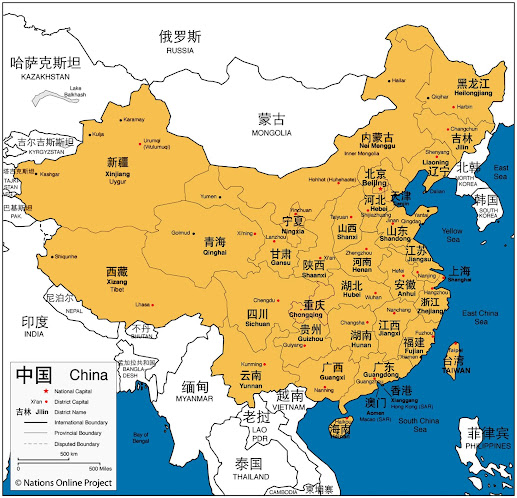Growing up in India, I knew of only a couple of states that had mundanely descriptive names, e.g., Uttar Pradesh ("northern province") and Madhya Pradesh ("central province"). Some were a bit more poetic, e.g., Himachal Pradesh ("snowy-slopes province"), being at the foothills of the Himalayas, and Arunachal Pradesh ("dawn mountain province"), being the easternmost state in the country and hence the "state of the rising sun". Some states had grandiose names, e.g., Maharashtra ("great nation") and Rajasthan ("land of kings"). And then there were those with slightly cryptic, yet still intelligible, meanings, e.g., Punjab ("land of five rivers").
During the Cambodian crisis in the 70s, a Thai province bordering Cambodia was often in the news - Aranyaprathet, which is a corruption of the Sanskrit aranya-pradesh ("forest province").
Australia has its share of such names too - Western Australia, Northern Territory, South Australia, and the Australian Capital Territory.
Most other state and province names in the world are just names. They don't describe the place in any way.
When I started to look at the names of China's provinces, I was struck by the mundane descriptions of many of them. These referred to a geographical feature, and a relative position of the province to that feature.
E.g.,
河北 Hé-běi ("North of the river")
河南 Hé-nán ("South of the river")
湖北 Hú-běi ("North of the lake")
湖南 Hú-nán ("South of the lake")
山西 Shān-xī ("West of the mountain")
山东 Shān-dōng ("East of the mountain")
江西 Jiāng-xī ("West of the river")
Check these out. Once you understand the meanings of these names, you won't be able to forget them in a hurry, and you'll probably be able to point these provinces out on an unmarked map pretty easily.
I found the following maps on the Internet. This one has the province names spelt out in Chinese characters (hànzì) as well as their romanised pronunciation (pīnyīn).
This one has loose English translations of every province's name. Some of them are quite amusing.
Some interesting takeaways:
1. There are many words in Mandarin for "river":
河 hé江 jiāng
川 chuān
2. Chinese words that are associated with water usually have three strokes on the left - two short strokes going down left to right, and one longer stroke going down right to left. You can see these three strokes in the character for "lake":
湖 húAnd for sea:
海 hǎiThey look like drops of water.
3. The word 川 chuān (one of the words for "river") looks visually evocative of a flowing stream of water.
Now this is purely my conjecture, but I think that the word 州 zhōu that forms part of the names of several cities (e.g., Sūzhōu, Hángzhōu) is related to the word 川 chuān, because it visually represents settlements on the banks of a river. I could be wrong, but I'm willing to bet I'm right!
4. The province 四川 Sì-chuān has an interesting relationship to the Indian state of Punjab. As we recalled earlier, Punjab means "the land of five rivers".
Sì-chuān means "four rivers".
5. The word 山 shān ("mountain") looks like a mountain, doesn't it? The power of ideographs.
I read somewhere that the mountain symbol, when repeated thus 出 chū, means "out", and is associated with exile. If someone is exiled "beyond two mountains", they are "out".
When the "out" symbol 出 chū is used in combination with the symbol for "mouth" 口 kǒu, it means "exit" 出口 chūkǒu. You will see this on every highway in China. (Much better than the titter-inducing "Ausfahrt" signs on the German Autobahn.)




No comments:
Post a Comment